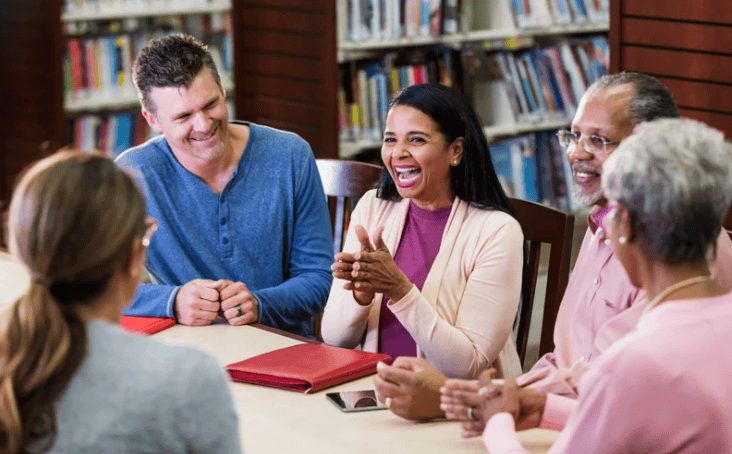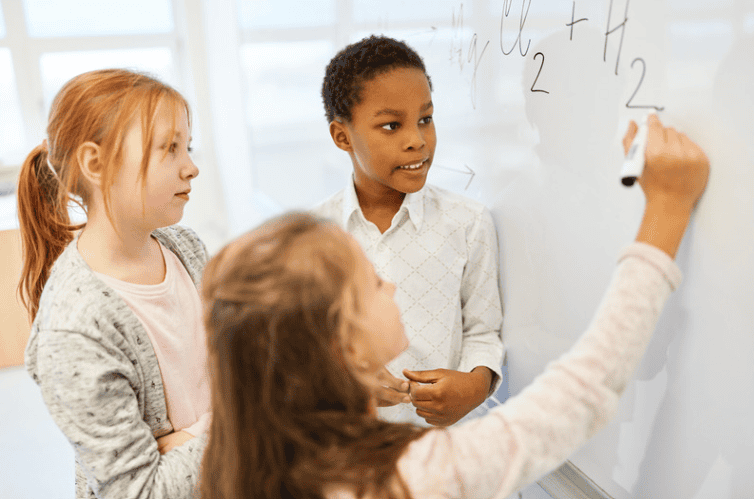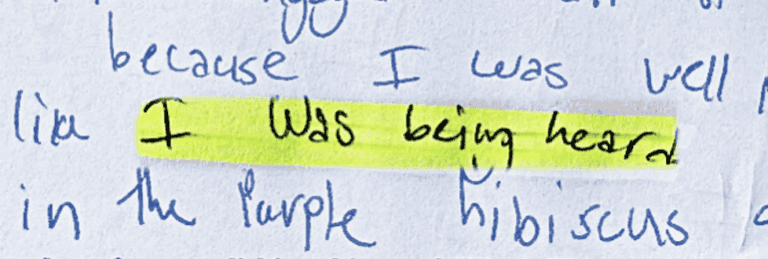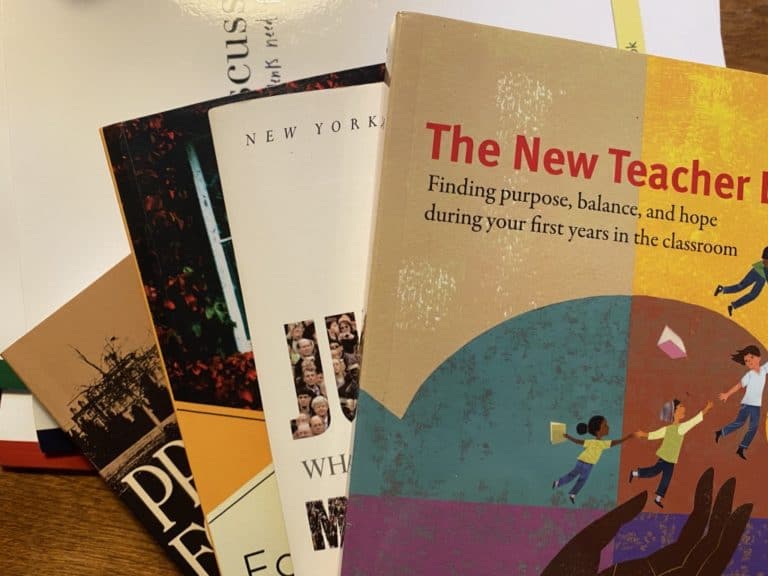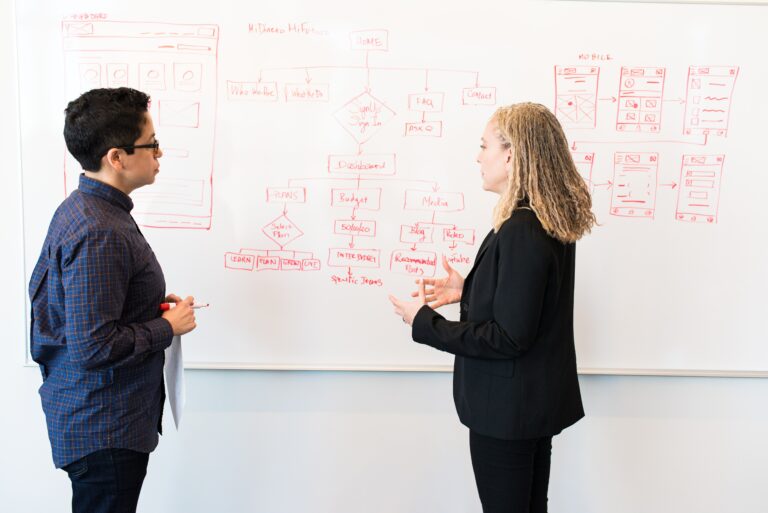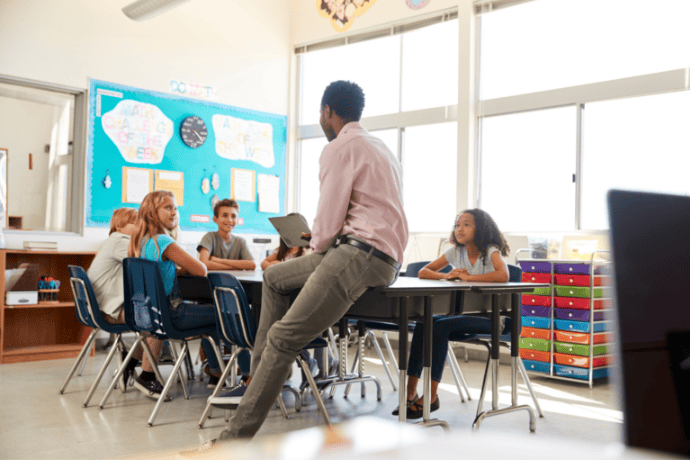R.E.A.L.® Trainer Spotlight: Patrick Farmer
Name/Hometown: Patrick Farmer, Newton, Massachusetts
Current Role and School: Sixth grade lead teacher at Nativity Preparatory School of Boston.
How did you learn about R.E.A.L.®?
I used to work at Shady Hill School, where Liza had done her teacher training. One of Liza’s mentors is also one of my mentors, and she saw that we were thinking about some of the same things when it came to conversation. She connected us pretty early on in the R.E.A.L.® journey.
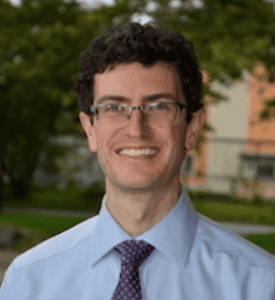
I did the training and got to try out an early version of the program at Shady Hill, and it was really cool. I’ve loved being part of R.E.A.L.® and seeing it grow. What’s been especially cool is seeing how we can use the same skills to address a different set of needs. At Shady Hill, for example, kids were kind of tech-oriented. We realized they didn’t always have these face-to-face conversation skills, because they’d been used to communicating through a phone. At my current school, Nativity Prep, that’s less of a challenge. I’d say the challenge at Nativity is learning the cultural norms around an intellectual conversation and exploring different versions of different conversations. It’s been really cool to think about how to translate those same R.E.A.L.® skills in a very different cultural context.
Nativity is where it really has helped to think about conversation with a sports metaphor. Conversation is kind of like a team sport – no one person is going to “win” the conversation. The win comes when your team develops new understanding. We’ve gotten good mileage out of that.
Thinking back to your first R.E.A.L.® discussion, how did that go? What were you nervous about? Did anything surprise you?
Oh, it was a total disaster. I learned a lot from that. What I learned from that mess of a first discussion was that just because it’s a mess doesn’t mean learning isn’t happening. That was a really formative moment for me, because at first I thought, everything is going wrong. Kids were talking over each other, nobody was on topic, I thought I’d messed up because I somehow didn’t prepare them.
What I learned from that mess of a first discussion was that just because it’s a mess doesn’t mean learning isn’t happening.
Patrick Farmer
And what I have really learned is that all of that is okay. Whatever happens in that discussion is okay, because it’s all just the raw material from which we’re going to do the learning when we process what happened in there.
My journey has been learning to be okay with the chaos of those discussions and knowing that even if it goes off the rails, it’s still going to serve the purpose of bringing the kids back to reflect on what happened and why, and what other moves we could have made that might have changed the outcome of the conversation. Then we get in next time, and we try it again.
I love the idea of R.E.A.L. ® discussion being the raw material that you learn from. I think that’s a beautiful way to view it, because whatever happens, you can use it to learn and grow.
Exactly. Early on, I was really focused on the content of the discussion: what are they saying? Are they getting to good ideas? And that kind of thing. The more I’ve worked with R.E.A.L.®, the more I’ve realized that the content is actually the less important thing happening during those discussions.
In those first chaotic discussions or perhaps later, can you think of a breakthrough moment you’ve seen with a student or group of students that stands out to you?
There are often some of those, and it’s pretty special. I can remember a group that was talking about a coming-of-age novel about a boy, and it’s kind of standard middle school stuff. But I remember a really cool moment where a group got deep into that and in discussion started to realize that, everywhere in the book, there were other things that were moving from small to big. There was a chapter discussing where the boy was watching the boats in the river and noticing how big they were. And the kids in the class started to think, oh my gosh, wait – the boats are getting bigger, and he’s getting bigger! It’s a metaphor! They jumped up and stopped the discussion and ran over to me and said Mr. Farmer, we just figured it out! And I said, that’s great – now get back in there!
That was really cool. That middle school shift from concrete to abstract thinking starts to happen. What I loved about this was they figured it out for themselves. None of them came into the conversation with that idea. They worked it out together, and then the level of excitement they had about the idea was through the roof.
What I loved about this was they figured it out for themselves. None of them came into the conversation with that idea. They worked it out together, and then the level of excitement they had about the idea was through the roof.
Patrick Farmer
That was a rich moment for me, and it reinforced why we do this. Making new discoveries about what we’re reading is exciting, and that excitement is contagious and really fun.
Why did you join R.E.A.L.® as a trainer?
I think what made me want to train was the experience of learning to sit with the chaos of a student discussion. The more I started talking about and processing that, I realized that so many teachers have often been very successful as students and can be kind of perfectionist about what happens in the classroom. I think my number-one message I wanted to share as a trainer was that R.E.A.L. ® empowers you to let go of that and live in the moment with your students. That can create a more powerful learning experience than whatever perfectly sculpted lesson I’ve dreamt up. Joining my students where they are in the mess, and helping them make meaning of that – that’s where learning can happen. That’s the message I want to share with my brilliant, perfection-oriented colleagues from whom I learn so much. There’s one thing to add: it’s ok to be messy.
My number-one message I wanted to share as a trainer was that R.E.A.L. ® empowers you to let go of [perfectionism] and live in the moment with your students. That can create a more powerful learning experience than whatever perfectly sculpted lesson I’ve dreamt up. Joining my students where they are in the mess, and helping them make meaning of that – that’s where learning can happen.
Patrick Farmer
What is your favorite part of the workshops you lead?
My favorite part is trying out the mock discussion. Because kids, adults – we’re all just people, and I see the same things happen in these mock discussions with adults that I see with my students. We’re all trying so hard to follow the rules, and it’s kind of clunky and awkward, and I love that in the mock discussion we get to feel that awkwardness that our students are going to feel magnified a million times over, because they’re already self-conscious adolescents. Then we get to talk about how some of that felt awkward for us, even as fairly secure adults. So how do we prepare our students to navigate some of that awkwardness? How can we set them up for success? It’s not like we read some article about it – we actually felt it.
When it comes to discussion in general, what do you see as the power of discussion in today’s world for students, teachers, and parents?
I think the power of discussion is that we’re engaged in collaborative meaning-making, and that is such a model our world needs to solve problems. No one’s coming to the discussion with the right answer. We’re coming with some ideas, and we’re going to use those ideas as raw material to build some new understanding together as a group.
There are not a lot of contexts where we get to practice that. So much of school is about: I watch the video, I get the information, I spit it out on the test. This is different from that.
There’s kind of a radical vulnerability, a loose holding of ideas that happens in discussion. You come in with what you think – but not your final thoughts. You come in at a starting point. Teaching kids to enter into discussions with that kind of humility and understand that it’s okay if their ideas might change as a result of this discussion is really important. It’s really different from what tends to happen in our world, where I know what I think, you know what you think, and we’re going to fight until one of us yields. No way. That’s a dead end.
There’s a kind of radical vulnerability, a loose holding of ideas that happens in discussion…Teaching kids to enter into discussions with that kind of humility and understand that it’s okay if their ideas might change as a result of this discussion is really important.
This is a way of helping kids learn that you don’t have to hold your ideas so tightly – and actually, if you hold them a little more with an open palm, you’ll bring others in, and you’ll get something better out of it.
That answer is so helpful, and I resonated with a lot of what you said. Can you think of anything in you brown background that’s helped you realize the power of your voice and discussion?
Certainly when I think of my own experience as a student, the moments that stand out to me were those when teachers were willing to take the risk and open up discussion. The seminar-style classes in high school and college were the places where I learned the most and where I connected the most with my classmates and teachers. That was definitely a formative influence.
I think another influence for me was that I had a kind of different path in my career. As a divinity student, I did my hospital chaplaincy rotations, and that was a really powerful meditation on deep listening to people in a lot of pain, and listening to them making meaning of that pain really deeply moved me. It showed me the power of conversation in terms of making sense of really complex grapplings with these things. The way we can do that is by creating space to listen as we talk out our ideas. So I think in some small way, R.E.A.L.® is like that. It creates norms around making space to talk and wrestle with big stuff.
That’s just beautiful. I would love to know, at this point in your life: who inspires you?
I have lots of teacher mentors I look up to, but really my inspiration right now is my students. The deck is stacked against them through no fault of their own. By virtue of my identity as a white, straight male, I have never had to live that experience. The grit and resilience of my students who take that with a smile on their face and do everything they can to break those barriers is an endless source of inspiration.
Last question: do you have any reading recommendations?
Yes. Mostly in the summer, I’m reading fiction for fun. One book I really loved recently is called The Madstone, and it’s a western, which is not my typical genre. It’s a really fun, totally engrossing adventure. I love that it’s narrated in the first person by a character, Benjamin, who’s trying to make sense of these experiences that are happening to him. He’s using the narration of the book to try to figure out what’s happening and kind of grow up. I do think there’s something there about discussion too, even if it’s a discussion with the reader.
Thank you, Patrick, for chatting with us and for all the work you do on behalf of R.E.A.L.®!
